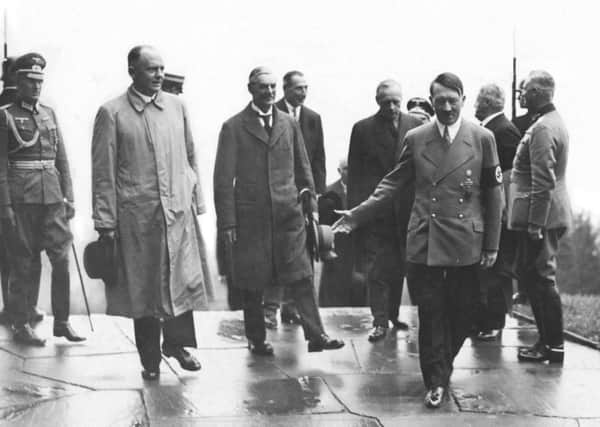Book review: Munich by Robert Harris


Robert Harris has no doubts. His Chamberlain is a heroic figure, whose tough negotiation infuriated Hitler. Moreover, in 1938 few were ready to go to war over the Czech question. Memories of the 1914-18 war were keen, in Germany as well as Britain.Germans cheered Chamberlain just as the British did, because he seemed to have averted a terrible and unnecessary war. Moreover in the first chapter of the novel, Harris has the chiefs of all three services explain their complete unreadiness to the Prime Minister; it would be, they say, at least another year before Britain was in a condition to fight.
This, however, is a novel and a gripping one; Harris is a marvellously compelling storyteller. Though Chamberlain is the central figure, sympathetically and convincingly portrayed, the story is told through the eyes of two fictional characters, Hugh Legat, a Foreign Office high-flier seconded to the Prime Minister’s staff, and Paul von Hartmann, a Germany diplomat. They were friends at Oxford where Hartmann, who owes something to Adam von Trott zu Solz, was a Rhodes scholar.
Advertisement
Hide AdNow Hartmann, though of necessity a Nazi Party member and also a German nationalist, loathes Hitler and the Nazi gangsters. He belongs to a resistance group; they believe Hitler is leading Germany to disaster. He also knows Hitler is determined to have his war, and is in possession of documents that prove it. He contrives to send one of these to Legat.
Here we come to one of the paradoxes of Munich. Much of the German High Command were against a war in 1938 because they feared Germany would lose. Hartmann and his associates in the Army and Foreign Office are preparing a coup, ready to arrest or kill Hitler. From their point of view it is essential that there should be no agreement with Britain and France. Another easy triumph will boost Hitler’s popularity. Chamberlain’s decision to fly to Munich stymies them. Hartmann contrives to be assigned to the German delegation there, hoping, by way of his friendship with Legat, to provide evidence which will prevent Britain from coming to an agreement over Czechoslovakia.
We have always known that there was a German resistance to Hitler, in the upper ranks of the army and the old aristocracy which staffed the German Foreign Office. More debatable is its commitment to action and possible effectiveness. What is undeniable is that every success for Hitler cut the ground from under its feet. Harris presents Hartmann and his collaborators persuasively.
Munich is a historical novel, a novel of ideas and a gripping thriller. Harris follows the best practice of writers of historical novels set in recent times; that’s to say, he presents real-life historical figures through the eyes of fictional characters. So we see Chamberlain and Hitler – and others such as Mussolini, Goering and British politicians (among them Alec-Douglas-Home, then known as Lord Dunglass) as perceived by Legat and Hartmann. They are brought to life, without the pretence that we are entering their minds.
Harris writes with complete and compelling authority. Like all his novels Munich has been thoroughly researched, but the research has been digested and is never obtrusive. You feel that this is how it must have been. The short scene on the morning after the Munich Agreement was made, when Chamberlain visits Hitler in his apartment to extract the subsidiary joint agreement which he flourishes at the airport on his return to England, is beautifully managed. We know, though we aren’t explicitly told, that it is this piece of paper which will ensure than when Hitler breaks his word the following year, we will go to war over Poland – and do so as a country that is grimly united.
*Munich by Robert Harris, William Heinemann, 341pp, £20